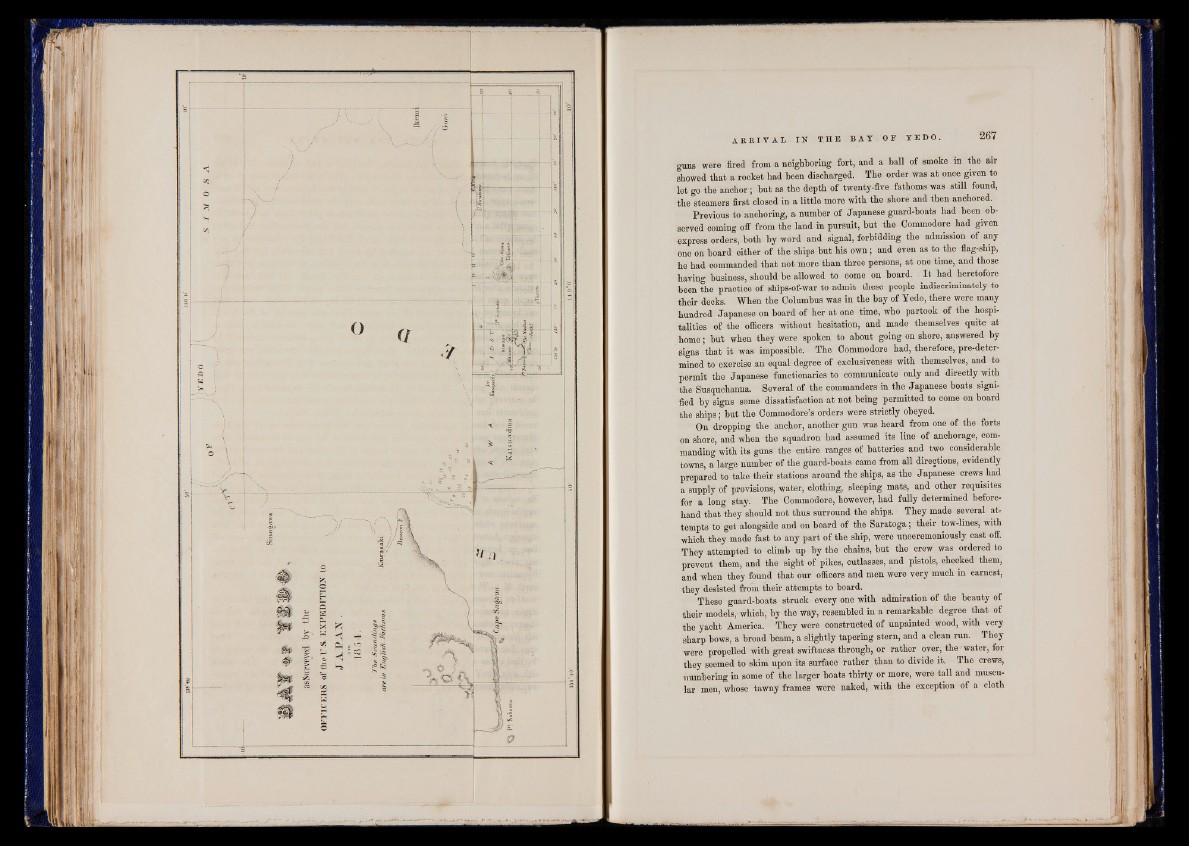
guns were fired from a neighboring fort, and a ball of smoke in the air
showed that a rocket had been discharged. The order was at once given to
let go the anchor; but as the depth of twenty-five fathoms was still found,
the steamers first closed in a little more with the shore and then anchored.
Previous to anchoring, a number of Japanese guard-boats had been observed
coming off from the land in pursuit, but the Commodore had given
express orders, both by word and signal, forbidding the admission of any
one on board either of the ships but his own; and even as to the flag-ship,
he had commanded that not more than three persons, at one time, and those
having business, should be allowed to come on board. I t had heretofore
been the practice of ships-of-war to admit these people indiscriminately to
their decks. When the Columbus was in the bay of Yedo, there were many
hundred Japanese on board of her at one time, who partook of the hospitalities
of the officers without hesitation, and made themselves quite at
home; but when they were spoken to about going on shore, answered by
signs that it was impossible. The Commodore had, therefore, pre-deter-
mined to exercise an equal degree of exclusiveness with themselves, and to
permit the Japanese functionaries to communicate only and directly with
the Susquehanna. Several of the commanders in the Japanese boats signified
by signs some dissatisfaction at not being permitted to come on board
the ships; but the Commodore’s orders were strictly obeyed.
On dropping the anchor, another gun was heard from one of the forts
on shore, and when the squadron had assumed its line of anchorage, commanding
with its guns the entire ranges of batteries and two considerable
towns, a large number of the guard-boats came from all directions, evidently
prepared to take their stations around the ships, as the Japanese crews had
a supply of provisions, water, clothing, sleeping mats, and other requisites
for a long stay. The Commodore, however, had fully determined beforehand
that they should not thus surround the ships. They made several attempts
to get alongside and on board of the Saratoga; their tow-lines, with
which they made fast to any part of the ship, were unceremoniously cast off.
They attempted to climb up by the chains, but the crew was ordered to
prevent them, and the sight of pikes, cutlasses, and pistols, checked them,
and when they found that our officers and men were very much m earnest,
they desisted from their attempts to board.
These guard-boats struck every one with admiration of the beauty of
their models, which, by the way, resembled in a remarkable degree that of
the yacht America. They were constructed of unpainted wood, with very
sharp bows, a broad beam, a slightly tapering stern, and a clean run. They
were propelled with great swiftness through, or rather over, the water, for
they seemed to skim upon its surface rather than to divide it. The crews,
numbering in some of the larger boats thirty or more, were tall and muscular
men, whose tawny frames were naked, with the exception of a cloth